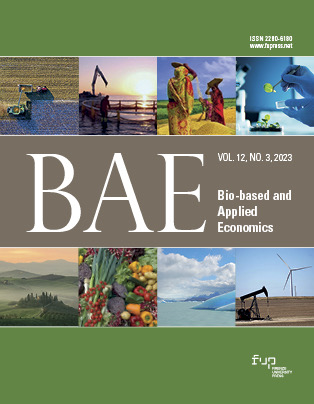Incorporating expert knowledge in the estimate of farmers’ opportunity cost of supplying environmental services in rural Cameroon
Published 2023-09-04
Keywords
- Bayesian analysis,
- environmental services,
- stated preferences,
- opportunity cost,
- rural Cameroon
How to Cite
Copyright (c) 2023 Claudiane Yanick Moukam, Calvin Atewamba

This work is licensed under a Creative Commons Attribution 4.0 International License.
Abstract
This paper applies a Bayesian approach to incorporate non-data information in estimating the opportunity cost for farmers in rural Cameroon to engage in biodiversity conservation and carbon sequestration efforts. Findings from our field survey reveal that only a small percentage of farmers are willing to participate in environmental protection programmes without compensation. A multidimensional preferences analysis indicates that this behavior may be attributed to a disconnection between environmental values and socioeconomic values. Bayesian analysis of the Tobit model, examining Willingness to Accept (WTA) compensation for agroforestry participation, highlights that factors such as aging, higher educational attainment, and higher socioeconomic status are highly likely to promote pro-environmental behaviors. The estimated opportunity cost of supplying environmental services is 10,775 CFA francs with a standard deviation of 333.6 CFA francs per farmer. These results differ qualitatively from the existing literature, underscoring the relative significance of considering expert knowledge in the interpretation of environmental policies.






